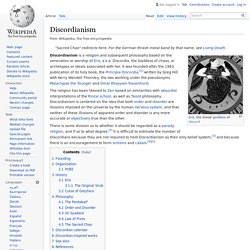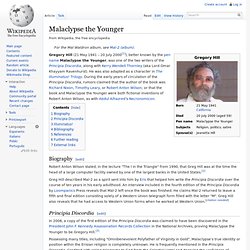

Discordianism. "Sacred Chao" redirects here.

For the German thrash metal band by that name, see Living Death. There is some division as to whether it should be regarded as a parody religion, and if so to what degree.[2] It is difficult to estimate the number of Discordians because they are not required to hold Discordianism as their only belief system,[3] and because there is an encouragement to form schisms and cabals.[4][5] Founding[edit] The foundational document of Discordianism is the Principia Discordia, fourth edition, written by Malaclypse the Younger, an alias of Greg Hill.
This book contains many references to an earlier source, The Honest Book of Truth (HBT). Organization[edit] The very idea of a Discordian organization is something of a paradox. POEE[edit] The sect of Discordianism founded by Malaclypse the Younger and Omar Khayyam Ravenhurst is known as the Paratheo-Anametamystikhood Of Eris Esoteric (POEE). the Principia contains some details about the structure of POEE. History[edit] Malaclypse the Younger. Gregory Hill (21 May 1941 – 20 July 2000[1]), better known by the pen name Malaclypse the Younger, was one of the two writers of the Principia Discordia, along with Kerry Wendell Thornley (aka Lord Omar Khayyam Ravenhurst).

He was also adapted as a character in The Illuminatus! Trilogy. During the early years of circulation of the Principia Discordia, rumors claimed that the author of the book was Richard Nixon, Timothy Leary, or Robert Anton Wilson; or that the book and Malaclypse the Younger were both fictional inventions of Robert Anton Wilson, as with Abdul Alhazred's Necronomicon. Biography[edit] Robert Anton Wilson stated, in the lecture "The I in the Triangle" from 1990, that Greg Hill was at the time the head of a large computer facility owned by one of the largest banks in the United States.[2] Principia Discordia[edit] In 2006, a copy of the first edition of the Principia Discordia was claimed to have been discovered in the President John F.
Illuminatus! Bibliography[edit] Parody religion. A parody religion or mock religion is an imitation belief system that challenges spiritual convictions of others, often through humor, satire, and/or burlesque (literary ridicule).

Often created to achieve a specific purpose related to another belief system, a parody religion can be a parody of several religions, sects, gurus, cults, and or new religious movements at the same time or a parody of no particular religion, instead parodying the concept of religious belief. In some parody religions, emphasis is on making fun and being a convenient excuse for pleasant social interaction among like-minded, e.g. the Church of the SubGenius. Other parody religions target a specific religion, sect, cult, or new religious movement. One approach to parody religion aims to highlight deficiencies in particular pro-religious arguments — the thinking being that if a given argument can also be used to support a clear parody, then the original argument is clearly flawed.
Post-modern religions[edit] Absurdism. Absurdism is very closely related to existentialism and nihilism and has its origins in the 19th century Danish philosopher Søren Kierkegaard, who chose to confront the crisis humans faced with the Absurd by developing existentialist philosophy.[3] Absurdism as a belief system was born of the European existentialist movement that ensued, specifically when the French Algerian philosopher and writer Albert Camus rejected certain aspects from that philosophical line of thought[4] and published his essay The Myth of Sisyphus.

The aftermath of World War II provided the social environment that stimulated absurdist views and allowed for their popular development, especially in the devastated country of France. Overview[edit] "... in spite of or in defiance of the whole of existence he wills to be himself with it, to take it along, almost defying his torment. Relationship with existentialism and nihilism[edit] Related works by Søren Kierkegaard[edit] What is the Absurd? What, then, is the absurd? Raven's Tarot Site.
Discordianism.